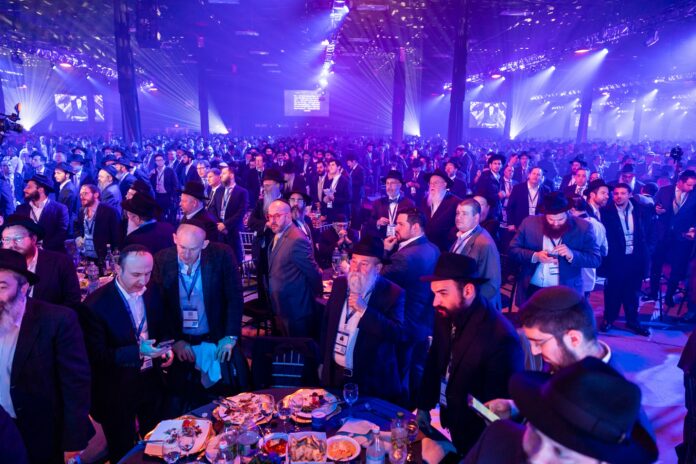Representing the newest crop of Chabad emissaries, Rabbi Laivy Mochkin, who recently moved to Palo Alto, Calif., said, “Although I never merited to meet the Rebbe in person, I did encounter on a daily basis the Rebbe’s message and mission. And that inspired my wife and me to similarly dedicate our own lives to our fellow Jews.”
As part of the presentation, Mochkin’s grandfather, Rabbi Berel Mochkin, senior Chabad representative in Montreal also spoke, a representative of the generation of emissaries dispatched by the Rebbe in the 1950s. He was followed by one emissary from each decade, concluding with the younger Mochkin, who himself grew up the son of Chabad representatives in Rochester, N.Y.
The evening’s host, Rabbi Moshe Kotlarsky, vice chairman of Merkos L’Inyonei Chinuch, the educational arm of the Chabad-Lubavitch movement, introduced the guest speaker, legendary philanthropist patron of Jewish life all over the world, Mr. George Rohr, as his “best friend for over 45 years,” who, following in the footsteps of his late parents, has spearheaded the growth of Chabad on six continents.
Rohr was born and raised to the late Sami and Charlotte Rohr, both Holocaust survivors, in Bogota, Colombia. As Sami recounted in his 2006 speech at the Kinus, he first encountered Chabad in the mid-1970s when a Chabad rabbi visited Colombia.
“Among the rabbis who visited Bogota, there came also Lubavitcher [rabbis],” the elder Rohr told the crowd at the time. It was his employees “who alerted me to the fact that Lubavitcher [emissaries] were different,” he went on. “The Lubavitchers wanted to know if they were married. Did they have children? They wanted to put tefillin on them. They did not come only for the money. And whenever a Lubavitcher came, I used to give him a bigger contribution than usual, and slowly each time, I became more interested in Lubavitch.”
Soon, Sami formed a close relationship with Rabbi Moshe Kotlarsky, and in 1980 the Rebbe agreed to send emissaries to Colombia, dispatching Rabbi Yehoshua and Rivky Rosenfeld to establish Chabad of Bogota.
By 1979, the younger Rohr was living in New York City, and Kotlarsky invited George to spend Shabbat in Crown Heights, Brooklyn.
Soon he came to feel very much at home in Crown Heights, where he became somewhat of a regular; over the next decade he attended some 30 farbrengens, not including the 35 or so times he met the Rebbe during Sunday dollars, kos shel bracha, lekach and the like.
In his speech, Rohr recounted in particular one of those encounters with the Rebbe, when he attended the Rebbe’s audience with members of the Machne Yisrael Development Fund in the autumn of 1991. “The [verse] states ‘Rejoice, Zevulun, in your excursions—meaning your business excursions—and Yissachar in your tents,’” Rohr said. “Two of Jacob’s sons were partners. Zevulun, the businessman, and Issachar, the Torah scholar. The Torah is specifically telling Zevulun to rejoice.
“In his talk at a Machne Israel Development Fund …that I was privileged to attend, the Rebbe asked: why does Zevulun rejoice? Firstly, said the Rebbe, because he works to exercise his individual potential to the fullest. And second, because Zevulun’s happiness stems mainly from his connection to Yissachar –i.e., to Torah, to its study, and its scholars,” Rohr said. “The two brothers, continued the Rebbe, established a full and multidimensional partnership, transforming Zevulun’s life, granting him fulfillment, purpose and peace of mind, as he supports Yissachar’s endeavors in learning and teaching Torah.”
“We supporters need to understand our relationship with the shluchim differently. We are not donors, and the shluchim are not recipients. We and they are us. We are partners. Partners in the work of Chabad, partners in the great vision of the Rebbe.”
In that spirit of partnership, thousands more Jewish children in the United States and Europe will experience Chabad overnight camping beginning next summer thanks to a $2.5 million grant from the Rohr Family Foundation and Project Rina, a philanthropic fund. It expands the activities of CKids (The Chabad Children’s Network), which offers a cohesive array of programs for Jewish children—including Hebrew schools, day camps, and after-school enrichment programs.
Celebration Welcomes 36 New Torah Scrolls
The evening concluded with the hoisting up of 36 new Torah scrolls—each of which will be sent to another Chabad center around the globe—before the scrolls were joyously carried around the cavernous hall during the jubilant dancing that capped the evening.
